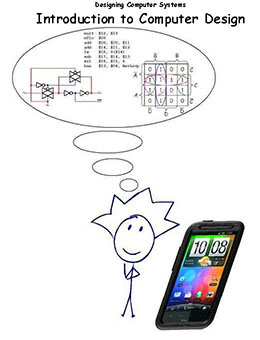The "Art" of Digital Design

A course offering under the Georgia Tech Honors Program, ECE2883-HPC: The "Art" of Digital Design, provides a multidisciplinary opportunity for Tech students.
Just as 3D printers and computer-aided design tools have opened up prototyping physical parts to a wide range of users, FPGAs (field-programmable gate arrays) have done something similar for digital electronics. But they've been around a lot longer than 3D printers! Why has their impact been more limited? What are they good for? We'll explore this and more.
But I don't know anything about digital electronics!
Right. You're not alone. But returning to that 3D-printer analogy, there are a lot of people making 3D parts that don't have the optimal structure or even use the best material. There's some room to learn along the way, and maybe make a few mistakes. And in the end, you might not be the best digital designer, but on some future project team, you might be the ME (or IE, or ID, or AE, or BME, etc.) who knows what's possible to do in the electronics, and maybe even enough to get it done.
Required books?
No books are required. A variety of electronic materials will be provided, including videos and lab exercises.
Some very good coverage of what is really needed (actually, more that what we really need) is in an eBook by the late GT-ECE professor Scott Wills and his wife Linda Wills:
Why is this "more" than what we need? Well, we don't actually have to design a "computer" to accomplish something significant.
If you want even more background, an excellent textbook available at no cost electronically through the Tech library is Digital Design and Computer Architecture, by Harris & Harris:
- Library record
- Direct link to electronic copy in ScienceDirect (you must first be logged in to GT Library in your browser)
Some optional readings will be given in Harris & Harris from time to time.
Anything else?
You will need your GT Computer Account — An account that allows you to log in to a campus Windows computer using a GT Active Directory (AD) account & password.
You will eventually utilize the free download of Altera Quartus II Web Edition, version 13.0, Service Pack 1 (installation procedure to be described later).
If you REALLY want books, you will get something out of the books currently used in ECE2031:
- Digital Design Laboratory Manual Second Edition, by Thomas Collins and Christopher Twigg (ISBN: 978-0-7575-7157-2). Available in the bookstores or directly from the publisher at http://www.kendallhunt.com/store-product.aspx?id=45513 (including an eBook option).
- Rapid Prototyping of Digital Systems SOPC Edition, by Hamblen, Hall, & Furman.
How does this relate to that other course, ECE2031?
Another course (ECE2031) utilizes the lab a lot more than this one. Those students are taking a required course for ECE, CmpE, and some CS students. They use the same CAD tools and equipment, but
- they start with a prerequisite in digital logic that mainly allows them to take a more analytical approach, and also allows them to conclude the course with the full implementation of a computer;
- they follow a more rigid structure, characteristic of a course that handles a lot of students;
- they have a design project, but it is not as thoroughly integrated across the entire semester as yours.
What to expect
We meet weekly for a fairly typical Honors Seminar in our assigned Clough classrom. We will eventually split up into project teams, and they will meet at mutually agreed times, sometimes in the Digital Design Lab (Van Leer E283), and sometimes in locations convenient to the teams (who will have take-home hardware and software). We'll have a problem-based learning model, with a bit more "pushing" of information in the seminar session, along with some discussion about what we need to do in the lab to move each of your projects along. Then, in the lab, you'll be assisted by Dr. Collins and Kevin Johnson in a combination of learning activities and designing/building activities.
